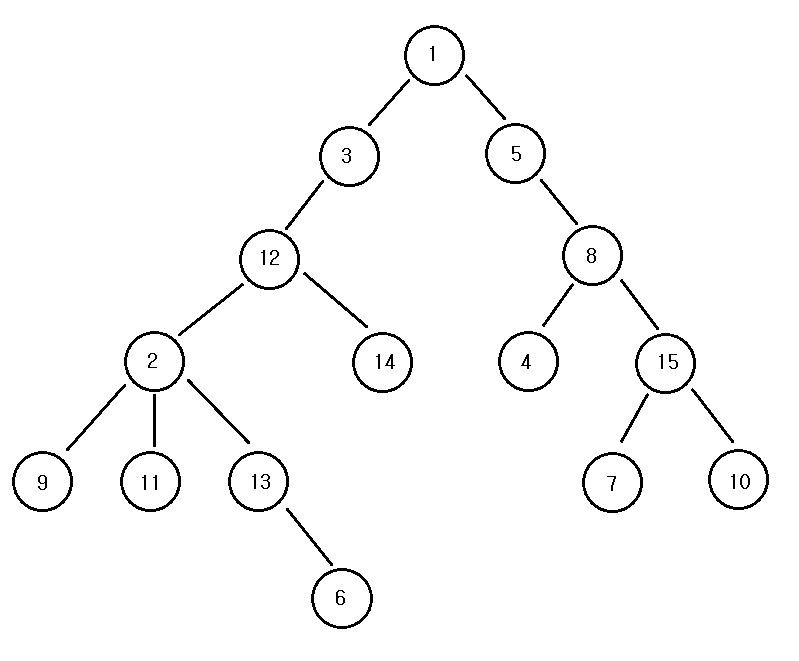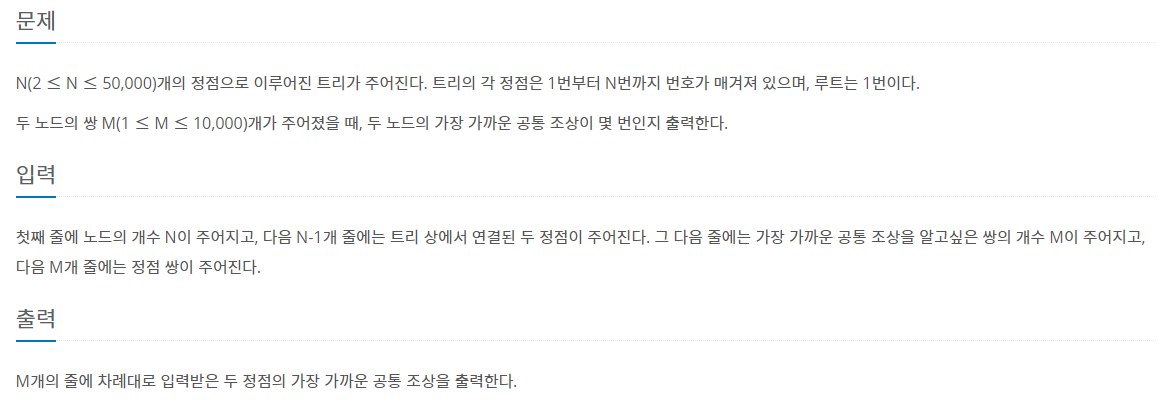정의
최소 공통 조상을 찾는 알고리즘
즉, 두 노드에서 가장 가까운 공통 조상을 찾는 알고리즘이다.

다음과 같은 그래프에서 6과 9 노드의 최소 공통 조상은 2이다.
마찬가지로, 10과 4의 최소 공통 조상은 8이 된다.
접근
최소 공통 조상을 찾는 방법은 각 노드에서 부모를 타고 올라가서 같은 부모를 찾으면 될 것이다.
하지만 이 때, 양 노드의 LEVEL이 같아야 이러한 방법으로 접근할 수 있다.
결과적으로, 각 노드의 부모와 레벨을 알아야 한다.
필요한 것은 각 노드의 부모와 레벨, 그리고 트리이다.
깊이와 부모를 저장한 상태로 있다고 가정하고, 6과 14의 공통조상을 구해보면,
루트 노드의 레벨을 1이라 하면, 노드 6의 레벨은 6, 14의 레벨은 4이다.
| 노드 | 레벨 | 부모 노드 |
|---|---|---|
| 6 | 6 | 13 |
| 14 | 4 | 12 |
노드 6의 레벨이 더 크니, 레벨을 맞춰주기 위해 노드 6의 부모로 바꿔준다.
| 노드 | 레벨 | 부모 노드 |
|---|---|---|
| 13 | 5 | 2 |
| 14 | 4 | 12 |
같은 작업을 한번 더 수행한다.
| 노드 | 레벨 | 부모 노드 |
|---|---|---|
| 2 | 4 | 12 |
| 14 | 4 | 12 |
이렇게 수행하면 두 노드의 부모 노드가 12로 같은 것을 알 수 있다.
만약 여기서 부모 노드가 다르다면, 같을 때 까지 양 노드를 부모 노드로 바꿔주면 될 것이다.
그럼 어떻게?
각 노드의 부모 노드와 레벨을 저장하는 방법은 어떻게 할 까?
DFS를 돌면서 저장할 수 있다.
재귀를 한번씩 돌 때 마다 레벨이 1씩 올리면서 저장하고, 부모 노드 또한 저장할 수 있다.
예제 문제와 코드 - JAVA
다음 문제는 백준 11437번 LCA 문제이다.

import java.io.*;
import java.util.*;
public class Main {
static ArrayList<Integer>[] tree;
static int[] parents;
static int[] depths;
public static void main(String[] args) throws NumberFormatException, IOException {
BufferedReader br = new BufferedReader(new InputStreamReader(System.in));
BufferedWriter bw = new BufferedWriter(new OutputStreamWriter(System.out));
int inputCnt = Integer.parseInt(br.readLine());
tree = new ArrayList[inputCnt+1];
for (int i = 1; i <= inputCnt; i++) {
tree[i] = new ArrayList<Integer>();
}
parents = new int[inputCnt+1];
depths = new int[inputCnt+1];
Arrays.fill(depths,-1);
StringTokenizer st;
for(int i=0; i<inputCnt-1; i++){
st = new StringTokenizer(br.readLine());
int a = Integer.parseInt(st.nextToken());
int b = Integer.parseInt(st.nextToken());
tree[a].add(b);
tree[b].add(a);
}
dfs(1,1,0);//레벨 및 부모 노드 저장
int caseCnt = Integer.parseInt(br.readLine());
for(int i=0; i<caseCnt; i++){
st = new StringTokenizer(br.readLine());
int a = Integer.parseInt(st.nextToken());
int b = Integer.parseInt(st.nextToken());
int result = LCA(a,b);
bw.write(String.valueOf(result));
bw.newLine();
}
bw.flush();
bw.close();
br.close();
}
public static int LCA(int a, int b){
int aDepth = depths[a];
int bDepth = depths[b];
while(aDepth>bDepth){
a = parents[a];
aDepth--;
}
while(bDepth>aDepth){
b = parents[b];
bDepth--;
}
while(a!=b){
a = parents[a];
b = parents[b];
}
return a;
}
public static void dfs(int current, int depth, int parent){
depths[current] = depth;
parents[current] = parent;
for(int nextNode : tree[current]){
if(nextNode != parent){
dfs(nextNode,depth+1,current);
}
}
}
}
출력이 많아 BufferWriter를 사용하였다.

if(nextNode != parent){} 이 부분에 parent라고 하면 2번노드는 1번노드를 부모라고 인식을 안하지 않을까요? 따라서 nextNode != parents[current] 라고 수정해야하는게 맞지 않을지 궁금합니다.
어짜피 근데 리스트를 돌면서 확인하는 상황에는 그럴일이 없어보이긴하네욤..